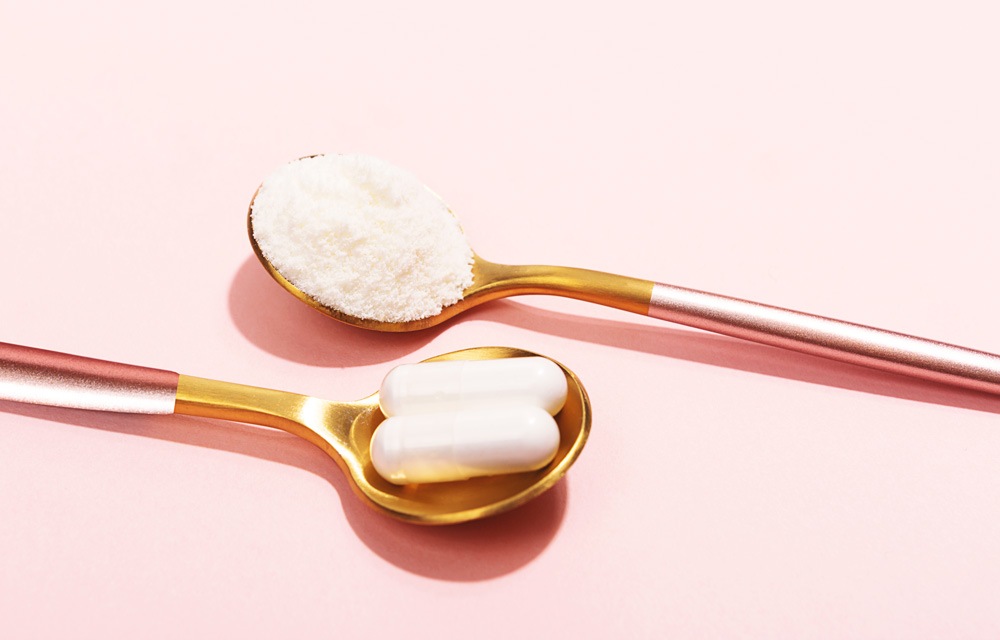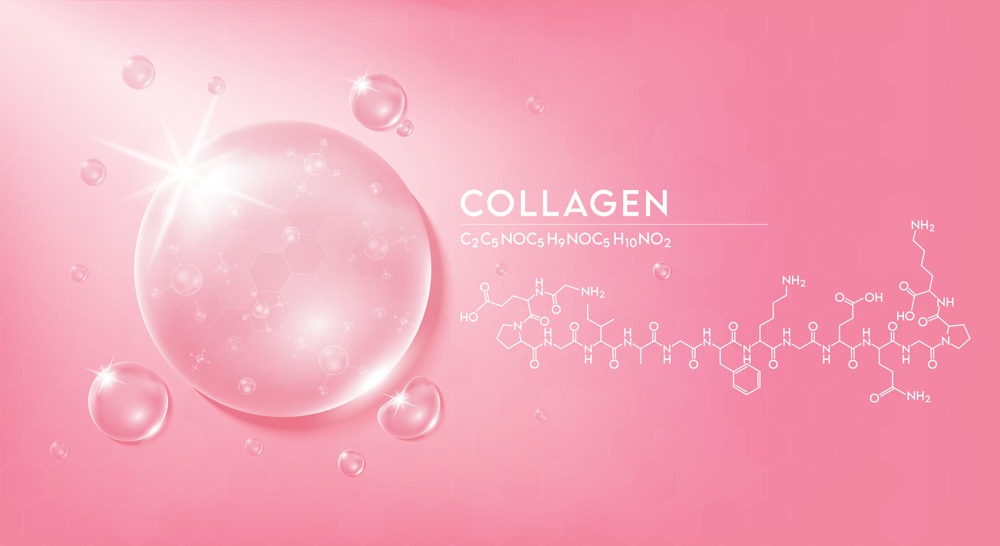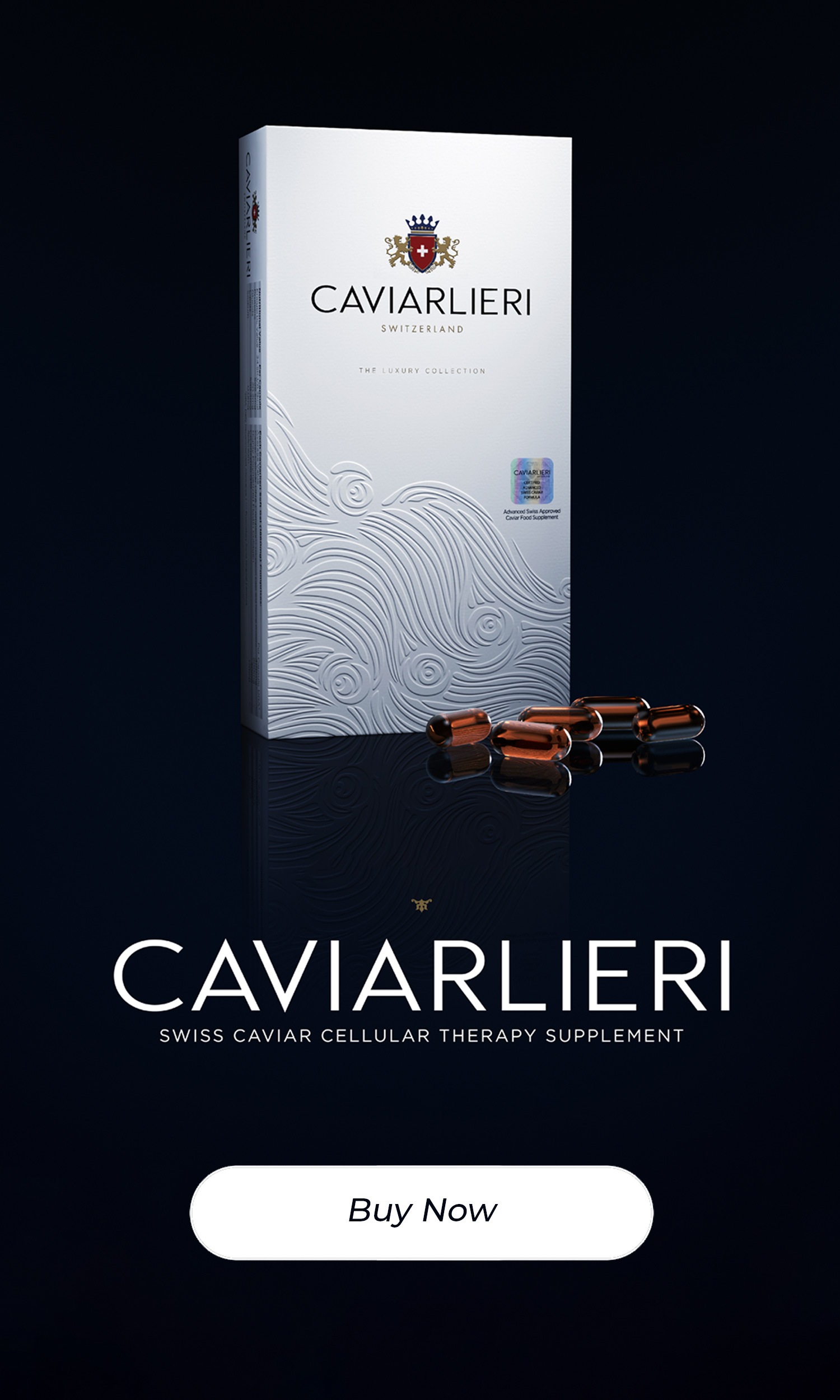Why Marine Collagen is Vital for your Skin?
Caviarlieri | Published February 25, 2022
What is Collagen?
Collagen is the largest component in the human body and it is the largest structural protein in the extracellular matrix in our body. It is in your bones, muscle and blood and comprises 70% of our skin and a third of the protein in your body. Formed of long-chain amino acids, its fibre-like structure is used to make connective tissues and it is responsible for the structure, function and mechanical properties of the epidermis (skin), cartilage and tendons. Collagen helps to make our tissues strong and resilient.
Collagen breaks down and diminishes as you age and with exposure to UV light, it becomes harder for your body to produce more. The degradation and reduction of collagen production in your body can begin as early as from the age of 25, leading to the loss of elasticity in your skin and reduced cell turnover. Our collagen production can also reduce significantly as a result of an unhealthy lifestyle – smoking, excess alcohol, sleep deprivation and lack of exercise etc.. With aging, collagen in the deep skin layers changes from a tightly organized network of fibres to an unstructured labyrinth of fibres. Environmental exposure like excessive exposure to the sun can also damage collagen fibres reducing their thickness, elasticity and strength, leading to the appearance of lines and wrinkles on the surface of Your skin.
Current evidence suggests that supplementing your body with the daily intake of collagen can reduce the symptoms associated with the lack of collagen including: fine lines, wrinkles, inflammation and stiff joints.
Can you Consume Collagen?
There is a lack of research to show that taking collagen can directly benefit skin or joint health. When digested in the stomach, collagen is broken down into amino acids, which are then distributed wherever the body most needs protein. Still, many foods that support collagen production are generally recommended as part of a healthful eating plan.
Foods containing collagen
- There are foods rich in collagen, specifically tough cuts of meat full of connective tissue like pot roast, brisket, and chuck steak. However, a high intake of red meat is not recommended as part of a long-term healthy and environmentally sustainable diet. Collagen is also found in the bones and skin of fresh and saltwater fish.
- Bone broth, a trending food featured prominently in soup aisles, is promoted as a health food rich in collagen. The process involves simmering animal bones in water and a small amount of vinegar (to help dissolve the bone and release collagen and minerals) anywhere from 4 to 24 hours. However, the amount of amino acids will vary among batches depending on the types of bones used, how long they are cooked, and the amount and type of processing (e.g., if it is a packaged/canned version).
- Gelatin is a form of collagen made by boiling animal bones, cartilage, and skin for several hours and then allowing the liquid to cool and set. The breakdown of these connective tissues produces gelatine. Collagen and its derivative, which is gelatine, are promoted on certain eating plans such as the paleo diet.
Foods that Boost Collagen Production

- Several high-protein foods are believed to facilitate collagen production in our body because they contain the amino acids that make collagen—glycine, proline, and hydroxyproline. [6] These include fish, poultry, meat, eggs, dairy, legumes and soy.
- Collagen production in our body also requires nutrients like zinc that is found in shellfish, legumes, meats, nuts, seeds, and whole grains and vitamin C from citrus fruits, berries, leafy greens, bell peppers, and tomatoes.
Do you need Collagen Supplementation?
Collagen TODAY has become a top-selling supplement purporting to improve hair, skin, and nails—key components of the fountain of youth.
As an ingredient, collagen is commonly used in skin creams and serums. However, its effectiveness as a topical application is doubted even by dermatologists, as collagen is not naturally found on our skin’s surface but in its deeper layers. Collagen fibres are too large to permeate into the skin’s outer layers, and current research has not supported that even shorter chains of collagen, called peptides, are more successful in doing so.
However, oral collagen supplements in the form of pills, powders, and certain foods are believed to be more effectively absorbed by the body and are extremely popular among consumers. These oral supplements are sold as collagen peptides or hydrolysed collagen, which are more easily absorbed by our body. Collagen supplements contain amino acids, the building blocks of protein and some may also contain additional nutrients related to healthy skin and hair
What does Research say about Collagen Supplements?

Most research on the effectiveness of collagen supplements is related to joint and skin health. Human studies are lacking but some randomized controlled trials have found that collagen supplements improve skin elasticity. Other trials have found that the supplements can improve joint mobility and decrease joint pain such as with osteoarthritis in athletes and others. Collagen comprises about 60% of cartilage, a very firm tissue that surrounds our bones and cushions them from the shock of high-impact movements. So a lack of collagen or a breakdown in collagen production by our body could lead to a loss of cartilage and thereby cause joint problems.
However, potential conflicts of interest exist in this area because most if not all of the research on collagen supplements are funded or partially funded by related industries that could benefit from a positive study result, or one or more of the study authors have ties to those industries. It may be self-serving to the companies and authors who have a commercial interest in its sales. This makes it difficult for one to determine how effective collagen supplements truly are and if they are worth their often hefty price.
The other downside of collagen supplements is the problem of knowing exactly what it contains or if the supplement will be able to do what the label promotes. There are also concerns of collagen supplements containing heavy metals which is inimical to the body. That said, the available research has however not shown any negative side effects in people taking collagen supplements.
Peer Reviewed Studies on Marine Collagen Peptides for Skin

In a study published in PMC Europe (Oxid Med Cell Longevity 2016), titled Skin Antiaging and Systemic Redox Effects of Supplementation with Marine Collagen Peptides and Plant-Derived Antioxidants: A Single-Blind Case-Control Clinical Study, fish skin marine collagen peptides were combined with plant-derived skin-targeting antioxidants (coenzyme Q10 + grape-skin extract + luteolin + selenium) were administered to volunteers (n = 41). Skin properties (moisture, elasticity, sebum production, and biological age) and ultrasonic markers (epidermal/dermal thickness and acoustic density) were measured thrice (2 months before treatment and before and after cessation of 2-month oral intake). The supplementation remarkably improved skin elasticity, sebum production, and dermal ultrasonic markers. Therefore, it is evident that a combination of marine collagen peptides with skin-targeting antioxidants could be effective and safe supplement to improve skin properties without the risk of oxidative damage.
In another study published in the Journal of Nutrition 2018, it was shown that oral supplementation with collagen bioactive peptides combined with chondroitin sulphate, glucosamine, L-carnitine, vitamins, and minerals significantly improved the clinical parameters related to skin aging and joint health, and therefore, might be an effective solution to slow down the hallmarks of aging.
A double-blind, randomized, placebo-controlled clinical trial was conducted on 120 subjects who consumed either the test product which is a liquid nutraceutical containing hydrolysed fish collagen, vitamins, antioxidants and other active ingredients or placebo on a daily basis for 90 days. Subjects consuming the test product had an overall significant increase in skin elasticity (+40%; P < .0001) when compared to placebo. Histological analysis of skin biopsies revealed positive changes in the skin architecture, with a reduction in solar elastosis and improvement in collagen fibre organization in the test product group. As reported in the self-perception questionnaires, these results were confirmed by the subjects' own perceptions in that participants agreed their skin was more hydrated and more elastic.
A review published in March 2020 in Nutrients found that collagen peptides act as antioxidants to quelch damaging free radicals and inflammation (both of which are associated with chronic diseases and aging) in skin cells. In another small study, 50 women ages 45 to 60 took 10 grams (g) of a marine collagen powder supplement for 12 weeks and had a 35 percent reduction in wrinkles compared with a group who took a placebo powder, as was reported in the Journal of Cosmetic Dermatology in March 2021. Measures of skin elasticity, hydration, and firmness also improved.
How Long Does It Take for Marine Collagen to Work?
With regular consumption, you may be able to see and improvement in your skin in 8 to 12 weeks, enough time for your skin to repair and rejuvenate.
The Bottom Line -Marine Collagen

Marine collagen supplements differ from eating fresh fish to obtain collagen. There is collagen in fish skin, bones, heads, scales, fins, and entrails, as well as in fish cartilage. These are parts you typically do not consume unless you eat small, whole fish (such as sardines, anchovies, or mackerel). In that instance, you will consume higher amounts of collagen compared with eating a regular fish.
If you are looking to maximize your intake of collagen and cost is not a factor (as these supplements can be pricey) you should consider adding marine collagen to your existing diet. Supplements can also provide a higher dose. They are available in powder form that you mix into liquid, like a smoothie or coffee, or as capsules. You should ensure that you choose hydrolysed collagen peptides, which are already broken down, this making them easily digestible by the body.
Subject
Recent Posts
-
The Amazing Benefits of Highly Polymerized Fish Collagen Peptides with Elastin – Caviarlieri
-
The World’s Most Effective Caviar DNA Extract with Marine Bioactive Peptides
-
Are Supplements effective for Joint Pain?
-
Why Is Sustainable Immunity Important for Your Long-Term Health
-
What is your “Body Age” – Biological Age?




